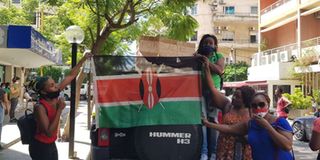Lobby demands protection, equal treatment of all Kenyans abroad

What you need to know:
- The International Relations Society of Kenya (IRSK) said Kenya must have a policy that gives protection to all Kenyans wherever they are.
Since the blast in Beirut, which killed at least 135 people and injured thousands others two weeks ago, some 20 women have camped at the - Kenyan consulate in Lebanon demanding to be evacuated.
- The IRSK said the situation in Lebanon was not isolated and called on the government to be consistent in its treatment of all Kenyans in the diaspora.
A foreign policy lobby in Nairobi has asked for government consistency in the treatment of Kenyans abroad, arguing they are the country’s frontline ambassadors.
The International Relations Society of Kenya (IRSK) said Kenya must have a policy that gives protection to all Kenyans wherever they are.
The Society, which represents professionals in foreign policy and security issues, was responding to reports by stranded Kenyans in Lebanon that they have been abandoned by the embassy.
“Kenyans abroad have valid expectations that the [diplomatic] missions will protect and help them in case of trouble,” the IRSK said in a statement on Sunday.
“The failure by the Ministry of Foreign Affairs and their consular division to proactively secure Kenyans’ interests abroad puts them at risk of harm and exploitation and could ultimately damage the image of the country.”
Evacuation delay
Since the blast in Beirut, which killed at least 135 people and injured thousands others two weeks ago, some 20 women have camped at the Kenyan consulate in Lebanon demanding to be evacuated.
But the Kenyan Embassy in Kuwait, which is accredited to Lebanon, says the women have been rowdy and refused to cooperate with consulate officials.
On Friday, Kenya’s Ambassador to Kuwait, Halima Mohamud, said the consular aid to the women may delay by a week after Lebanon extended a state of emergency in the capital.
The embassy, she said, had directly written to the group leaders of Kenyans in Lebanon explaining the delays and assured the provision of emergency travel papers should start by Tuesday.
Diaspora remittances
The IRSK, however, said the situation in Lebanon was not isolated and called on the government to be consistent in its treatment of Kenyans in the diaspora.
“The Kenyan passport needs to mean something. The claims of lack of a budgetary capacity to secure Kenyans in times of crisis is tragic,” said the lobby’s secretary, Dr Peter Mwencha.
“The important role that Kenyans abroad play in driving our economy, through remittance of billions of shillings, cannot be overlooked. It is saddening that when they need help, the same government cannot afford to assist them.”
The diaspora remitted some Sh286 billion to Kenya in 2019, according to the Central Bank, more than tourism.
State's response
The government insists it is always willing to provide consular services to any Kenyan abroad.
Foreign Affairs PS Macharia Kamau rejected the IRSK accusation of inconsistency, arguing that despite lack of budgetary allocations for evacuations, embassies abroad often assist.
“We have always been one of the first, if not the only African country, to evacuate. Every time there is a problem, if it is genuine, we always bring Kenyans home,” he told the Nation.
“Consular services are there to help people deal with the law and order situation and documentation in case they run into difficulties.”
For the Kenyans in Lebanon, officials say help could not arrive earlier because the women arrived in Lebanon as undocumented migrants and their employment situation in the country “was unknown,” according to the embassy in Kuwait.
Ms Mohamud told the Nation the women will only be helped if they cooperate with the consulate and register.





